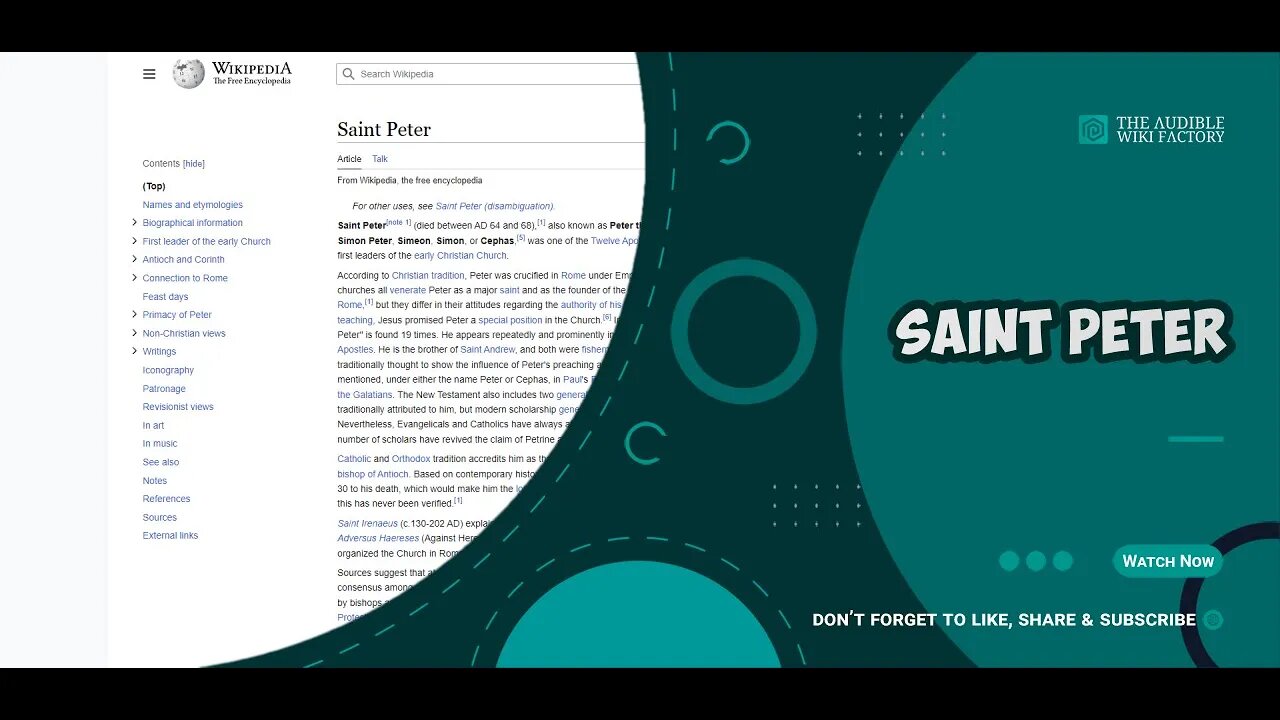Premium Only Content

Saint Peter, also known as Peter the Apostle, Peter the Rock, Simon Peter, Simeon, Simon, or
Saint Peter, also known as Peter the Apostle, Peter the Rock, Simon Peter, Simeon, Simon, or Cephas, was one of the Twelve Apostles of Jesus Christ and one of the first leaders of the early Christian Church.
According to Christian tradition, Peter was crucified in Rome under Emperor Nero. The ancient Christian churches all venerate Peter as a major saint and as the founder of the Church of Antioch and the Church of Rome, but they differ in their attitudes regarding the authority of his successors. According to Catholic teaching, Jesus promised Peter a special position in the Church. In the New Testament, the name "Simon Peter" is found 19 times. He appears repeatedly and prominently in all four gospels as well as the Acts of the Apostles. He is the brother of Saint Andrew, and both were fishermen. The Gospel of Mark in particular was traditionally thought to show the influence of Peter's preaching and eyewitness memories. He is also mentioned, under either the name Peter or Cephas, in Paul's First Letter to the Corinthians and the Epistle to the Galatians. The New Testament also includes two general epistles, First Peter and Second Peter, that are traditionally attributed to him, but modern scholarship generally rejects the Petrine authorship of both. Nevertheless, Evangelicals and Catholics have always affirmed Peter's authorship, and recently, a growing number of scholars have revived the claim of Petrine authorship of these epistles.
Catholic and Orthodox tradition accredits him as the first bishop of Rome—or pope—and also as the first bishop of Antioch. Based on contemporary historical data, his papacy is estimated to have spanned from AD 30 to his death, which would make him the longest-reigning pope, at anywhere from 34 to 38 years; however, this has never been verified.
Saint Irenaeus (c.130-202 AD) explains the Apostle Peter, his See, and his successors in book III of Adversus Haereses (Against Heresies). In the book, Irenaeus wrote that Peter and Paul founded and organized the Church in Rome.
Sources suggest that at first, the terms episcopos and presbyter were used interchangeably, with the consensus among scholars being that by the turn of the 1st and 2nd centuries, local congregations were led by bishops and presbyters, whose duties of office overlapped or were indistinguishable from one another. Protestant and secular historians generally agree that there was probably "no single 'monarchical' bishop in Rome before the middle of the 2nd century...and likely later." Outside of the New Testament, several apocryphal books were later attributed to him, in particular the Acts of Peter, Gospel of Peter, Preaching of Peter, Apocalypse of Peter, and Judgment of Peter, although scholars believe these works to be pseudepigrapha.
NAMES AND ETYMOLOGIES
The New Testament presents Peter's original name as Simon (Σίμων, Simōn in Greek). In only two passages, his name is instead spelled "Simeon". The variation possibly reflects "the well-known custom among Jews at the time of giving the name of a famous patriarch or personage of the Old Testament to a male child [i.e., Simeon] along with a similar sounding Greek/Roman name [in this case, Simon]".
He was later given by Jesus the name Cephas, from the Aramaic כֵּיפָא, Kepha, 'rock/stone'. In translations of the Bible from the original Greek, his name is maintained as Cephas in 9 occurrences in the New Testament, whereas in the vast majority of mentions (156 occurrences in the New Testament) he is called Πέτρος, Petros, from the Greek and Latin word for a rock or stone (petra) to which the masculine ending was added, rendered into English as Peter.
The precise meaning of the Aramaic word is disputed, some saying that its usual meaning is "rock" or "crag", others saying that...
LINK TO ARTICLE: http://en.wikipedia.org/wiki/Saint_Peter
TAGS: Saint Peter, Year of birth unknown, Burials at St. Peter's Basilica, Miracle workers, Twelve Apostles, Saints from the Holy Land, Saint Peter, People from Bethsaida, People executed by the Roman Empire, People executed by crucifixion, Patriarchs of Antioch, Christian saints from the New Testament, 1st-century Christian martyrs
#GeneralKnowledge #AudibleWikiFactory #Audible #Wikipedia #SaintPeter
-
 34:34
34:34
The Audible Wiki Factory
1 year agoSaint Patrick's Day, or the Feast of Saint Patrick, is a religious and cultural holiday held on
784 -
 1:02:56
1:02:56
Donald Trump Jr.
11 hours agoUSAID Slush Fund Slashed, X Cyberattack, Plus Interview with Nate Morris | Triggered Ep.223
124K111 -
 5:48:40
5:48:40
Dr Disrespect
14 hours ago🔴LIVE - DR DISRESPECT - THE SHOTTY BOYS - WARZONE, PUBG, FORTNITE
204K41 -
 2:12:50
2:12:50
Adam Carolla
16 hours agoDouble Murder Convict to be executed by Firing Squad + Comedian Elon Gold + Comedian Carol Leifer
76.3K4 -
 46:08
46:08
Kimberly Guilfoyle
11 hours agoBad Day to be a Bad Guy: FBI Taking Down World’s Worst Criminals, Live with John Nantz | Ep.203
161K59 -
 DVR
DVR
Redacted News
10 hours agoWhat's REALLY going on in Syria? | Redacted with Natali Morris
172K128 -
 54:18
54:18
Candace Show Podcast
10 hours agoHarvey Speaks: Jessica Mann & The Five Year Affair | Ep 3
182K84 -
 56:53
56:53
Grant Stinchfield
9 hours ago $7.37 earnedFreeze Spending & Kick the Can Down the Road... Why Republicans Should do Just That!
95.9K15 -
 56:48
56:48
VSiNLive
9 hours agoFollow the Money with Mitch Moss & Pauly Howard | Hour 1
75.5K1 -
 3:28:27
3:28:27
Barry Cunningham
11 hours agoTRUMP DAILY BRIEFING: INTERNET UNDER ATTACK! X & RUMBLE DOWN! EXECUTIVE ORDER SIGNING!
95K59